Meter / Gauge System -- On-Vehicle Inspection |
| 1. CHECK SPEEDOMETER |
Check operation.
Using a speedometer tester, check that the speedometer reading is within the allowable range shown in the table below. Also, check for proper operation of the odometer.
Reference Standard Indication Allowable Range 20 km/h 21 to 25 km/h 40 km/h 41.7 to 46.2 km/h 60 km/h 62.7 to 67.2 km/h 80 km/h 83.4 to 88.4 km/h 100 km/h 104.3 to 109.3 km/h 120 km/h 125.1 to 130.6 km/h 140 km/h 145.8 to 151.8 km/h 160 km/h 166.2 to 173.2 km/h 180 km/h 186.9 to 194.5 km/h - NOTICE:
- Do not use worn, underinflated or overinflated tires, as the speedometer reading will be inaccurate.
Check the deflection width of the speedometer indicator.
- Reference:
- Allowable range +-0.5 km/h
| 2. CHECK OUTPUT SIGNAL OF VEHICLE SPEED SENSOR |
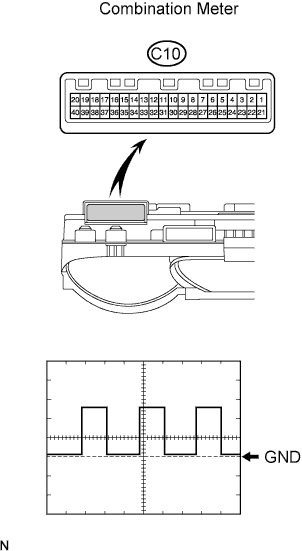 |
Check the output signal waveform.
Remove the combination meter, but do not disconnect the connector.
Using an oscilloscope, check the waveform of the combination meter.
Item Content Tester Connection C10-6 - C10-22 Tool Setting 5 V/DIV., 20 msec./DIV. Vehicle Condition Vehicle running - OK:
- Refer to the illustration.
- HINT:
- As vehicle speed increases, the wavelength shortens.
| 3. CHECK TACHOMETER |
Check operation.
Connect a tune-up test tachometer, and start the engine.
- NOTICE:
- Do not reverse the connections of the tachometer. This will damage its transistors and diodes.
- When removing or installing the tachometer, be careful not to drop or strike it.
Compare the test tachometer values and vehicle tachometer values under the following conditions:
- Vehicle battery voltage is 13.5 V
- Ambient temperature is 25°C (77°F)
If the result is not as specified, the tachometer may have a malfunction.OK Standard Tachometer Indication (rpm) Acceptable Range (rpm)
Data in ( ) are for reference only700 630 to 770 1,000 (900 to 1,100) 2,000 (1,850 to 2,150) 3,000 2,800 to 3,200 4,000 (3,800 to 4,200) 5,000 4,800 to 5,200 - Vehicle battery voltage is 13.5 V
| 4. CHECK FUEL SUCTION WITH PUMP AND GAUGE TUBE ASSEMBLY |
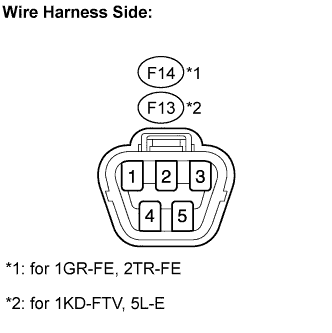 |
Disconnect the F14*1 or F13*2 pump and gauge connector.
Turn the ignition switch ON, and then check the position of the receiver gauge needle.
- OK:
- Fuel receiver gauge indicates E.
Connect terminals 2 and 3 of the wire harness side connector.
Turn the ignition switch ON, and then check the position of the receiver gauge needle.
- OK:
- Fuel receiver gauge indicates F.
| 5. CHECK FUEL LEVEL WARNING LIGHT |
 |
Disconnect the F14*1 or F13*2 pump and gauge connector.
Turn the ignition switch ON, and then check that the fuel receiver gauge indicates E and that the fuel level warning light turns on.
- OK:
- Fuel level warning light turns on.
| 6. CHECK LOW OIL PRESSURE WARNING LIGHT |
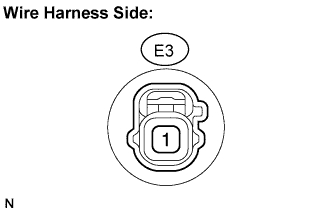 |
Disconnect the E3 switch connector.
Connect terminal 1 of the wire harness side connector to the body ground.
Turn the ignition switch ON, and then check that the low oil pressure warning light turns on.
- OK:
- Low oil pressure warning light turns on.
| 7. CHECK BRAKE WARNING LIGHT |
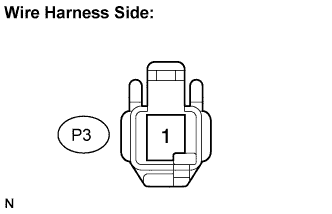 |
Check the parking brake warning light.
Disconnect the P3 switch connector.
Connect terminal 1 of the wire harness side connector to the body ground.
Turn the ignition switch ON, and then check that the warning light turns on.
- OK:
- Warning light turns on.
Check the brake fluid level warning light.
Disconnect the B2 switch connector.
Connect terminals 1 and 2 of the wire harness side connector.
Turn the ignition switch ON, and then check that the warning light turns on.
- OK:
- Warning light turns on.
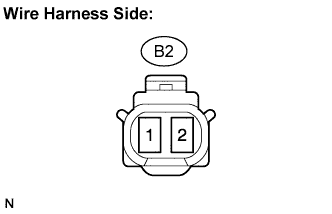 |
for 1KD-FTV or 5L-E:
Check the vacuum pump warning light.Disconnect the B3 switch connector.
Connect terminal 1 of the wire harness side connector to the body ground.
Turn the ignition switch ON, and then check that the warning light turns on.
- OK:
- Warning light turns on.
| 8. CHECK SEAT BELT WARNING LIGHT FOR PASSENGER SIDE |
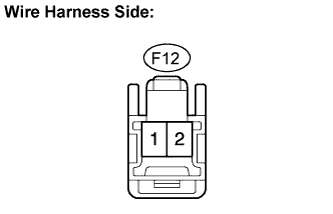 |
Disconnect the F12 switch connector.
Connect terminals 1 and 2 of the wire harness side connector.
Turn the ignition switch ON, and then check that the warning light blinks.
- OK:
- Seat belt warning light for passenger side blinks.
- HINT:
- *1: w/ Accessory meter
- *2: w/o Accessory meter